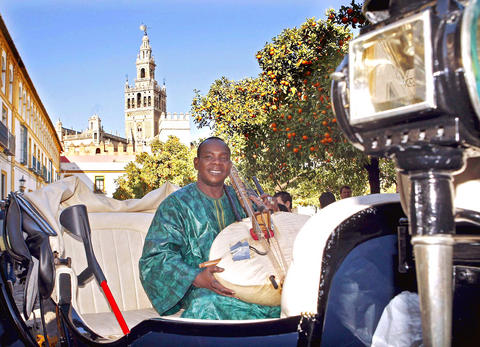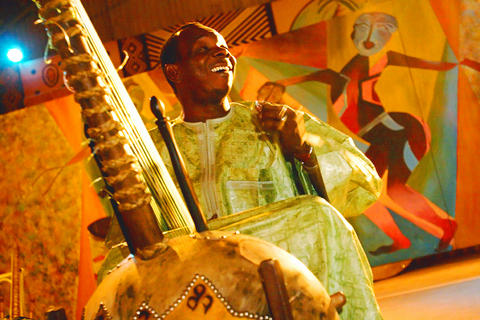Toumani Diabate is sitting under a tree in his moonlit front garden, down a dusty dirt road in Bamako, the Malian capital. He is picking out a melody on the kora, the West African harp of which he is a master, and talking about what it means to be descended from a long line of professional hereditary musicians, known as griots. "The first role of the griot is to make communication," he says. "The griots are like an archive. They know the histories and the stories. I'm playing a griot instrument and taking it outside Africa."
Diabate has devoted his life to demonstrating the versatility of the kora - and it has made him a global celebrity. He has performed with Bjork at Glastonbury, UK, ("I didn't play her music," he says, "I played my music"); accompanied the Malian diva Kandia Kouyate and recorded both with Spanish flamenco group Ketama and American blues guitarist Taj Mahal. Three years ago, he made the award-winning album, In the Heart of the Moon, with Mali's greatest guitarist, the late Ali Farka Toure, in a mobile studio set up in Bamako's Hotel Mande. A year later, he was in the same studio recording a very different album, Boulevard de L'Independence, this time with his experimental Symmetric Orchestra, a band which places his amplified kora against electric guitar, massed percussion, brass and keyboards. Now he is releasing a new solo album, The Mande Variations, which shows him returning the kora to its traditional roots.
Diabate finds it as easy to talk about the distant past as he does about the present, and sees no clash between the two. So one minute, here in his garden, he is discussing Sunjata Keita - the man who, in the 13th century, founded the great empire of the Mande people that spread from Mali across much of West Africa. The next, he's taking calls on the mobile phone that is his constant companion, talking about the new album and the mystical, spiritual attributes of the kora.

PHOTO: EPA
Diabate can trace his family back 71 generations, to the era of Sunjata - "and they have been musicians all that time." His father, Sidike, was acknowledged as the most influential kora player in Africa, thanks to his skill as both an accompanist and a solo musician. Diabate has expanded that role, determined to show that "there's no limit to what the kora can do."
And yet Diabate insists that his father never taught him to play. "My father was too busy. It was the time of independence [Mali broke away from French rule in 1960], and the president had asked him, my mother - a fine singer - and other musicians to form a national traditional band. So I taught myself, listening to my father and grandfather, and different musicians." His influences include not just the griots and guitar-based African bands like Senegal's Orchestra Baobab, but Jimi Hendrix, Otis Redding, the Scorpions, Bad Company and Pink Floyd. "But music was a gift to me from God," he says.
The kora is constructed from the shell of a large gourd, the calabash, decorated and covered in cow skin; it has a long neck with 21 strings made from nylon fishing line. The instrument is treated with great respect - students at the Bamako conservatory, where Diabate teaches, have to make a ritual offering of kola nuts, "as a sign of respect," before they touch the kora for the first time. Diabate is a devout Muslim, with his own prayer room next to his office, and for him the kora is a "deep and spiritual instrument." He demonstrates how a kora player uses just the index finger and thumb of each hand - in a position that "makes the name of God in the Koran" - but warns that the kora also attracts the mischievous ancient African spirits, the Jinns. "So it's sometimes dangerous to play the kora after midnight in Africa, because the spirits will come, and you can see the Jinns ... . "

PHOTO :AP
A noisy wedding got underway at the Hotel Mande during Diabate's first attempt to record The Mande Variations. So he and his producer, Nick Gold, moved the session to a little studio in Wood Green, North London, where they recorded the album in just two hours. It's a gentle, experimental record, taking in both ancient themes - as on the track Djourou Kara Nany, which, Diabate says, "makes use of a song about Mande history, from Sunjata's time" - and new praise songs, always a crucial part of a griot's repertoire. Two of these are named after London streets that are home to those who have helped his career. One such track, Elyne Road (in honor of Gold and his family) includes echoes of an old UB40 song, "because I remember the melody from when I first came to London."
Diabate's aim with the album is to make western audiences rethink their idea of African music. "Most people think that Africa doesn't have classical music," he says. "They think of Africa as having just dance and percussion - talking drums and calabash - but we have lots of music that's not percussion. People don't know that the kora is a great classical instrument."
But while Diabate sets out to educate Western audiences, he still has the duties of a modern-day griot to fulfill. Late one night in Bamako he performs at the Tamani Awards (Mali's music awards) where he is honored for the "best traditionally inspired music." From there he moves on to the Hogon, the open-air club where he plays every Friday night when he's in Bamako, and has done for 16 years. The dance floor is in semi-darkness, lit only by the moon, a strip of green neon behind the stage, and a few lights behind the bar. The Symmetric Orchestra has been playing for hours by the time Diabate joins them, at nearly 2:30am. He sits at the back of the stage talking on his mobile phone, then joins in, cutting through the massed percussion and electric guitar, improvising on his amplified kora. And the floor fills up with people dancing furiously in the dark.

Taiwan has next to no political engagement in Myanmar, either with the ruling military junta nor the dozens of armed groups who’ve in the last five years taken over around two-thirds of the nation’s territory in a sprawling, patchwork civil war. But early last month, the leader of one relatively minor Burmese revolutionary faction, General Nerdah Bomya, who is also an alleged war criminal, made a low key visit to Taipei, where he met with a member of President William Lai’s (賴清德) staff, a retired Taiwanese military official and several academics. “I feel like Taiwan is a good example of

March 2 to March 8 Gunfire rang out along the shore of the frontline island of Lieyu (烈嶼) on a foggy afternoon on March 7, 1987. By the time it was over, about 20 unarmed Vietnamese refugees — men, women, elderly and children — were dead. They were hastily buried, followed by decades of silence. Months later, opposition politicians and journalists tried to uncover what had happened, but conflicting accounts only deepened the confusion. One version suggested that government troops had mistakenly killed their own operatives attempting to return home from Vietnam. The military maintained that the

Before the last section of the round-the-island railway was electrified, one old blue train still chugged back and forth between Pingtung County’s Fangliao (枋寮) and Taitung (台東) stations once a day. It was so slow, was so hot (it had no air conditioning) and covered such a short distance, that the low fare still failed to attract many riders. This relic of the past was finally retired when the South Link Line was fully electrified on Dec. 23, 2020. A wave of nostalgia surrounded the termination of the Ordinary Train service, as these train carriages had been in use for decades

Lori Sepich smoked for years and sometimes skipped taking her blood pressure medicine. But she never thought she’d have a heart attack. The possibility “just wasn’t registering with me,” said the 64-year-old from Memphis, Tennessee, who suffered two of them 13 years apart. She’s far from alone. More than 60 million women in the US live with cardiovascular disease, which includes heart disease as well as stroke, heart failure and atrial fibrillation. And despite the myth that heart attacks mostly strike men, women are vulnerable too. Overall in the US, 1 in 5 women dies of cardiovascular disease each year, 37,000 of them